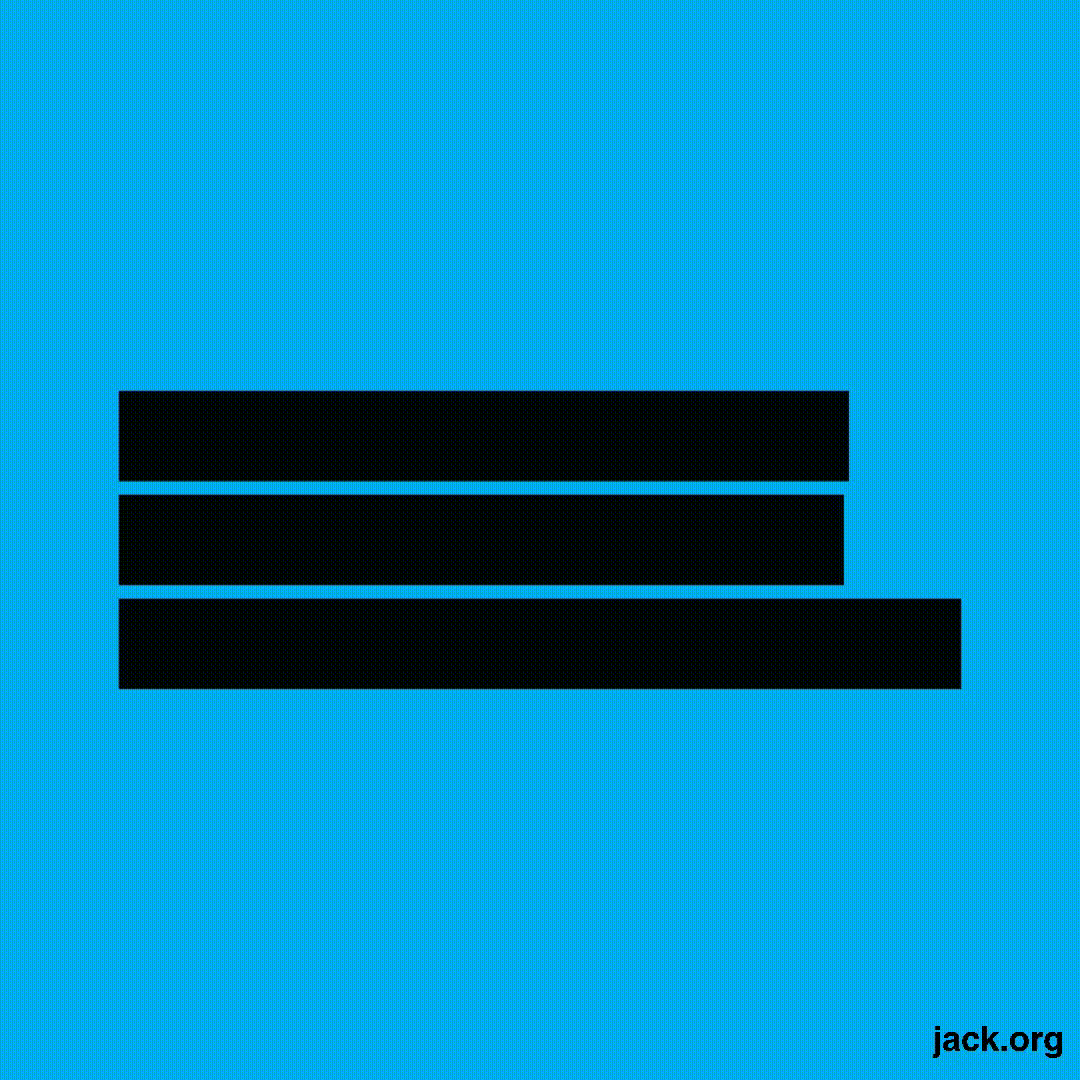
2020 ANNUAL REPORT
July 2019 - June 2020
Letter from
ERIC WINDELER
Founder & Executive Director, Jack.org

Dear friends and supporters of Jack.org,
During the first act of the 2020 fiscal year, Jack.org’s board and staff, along with our Network Liaisons, Network Representatives, and young leaders across the country, were making long-term plans for the future. Specifically, we were writing our second 5-year strategic plan. Those plans were driven by a simple objective: to respond to the needs of young people across the country and ensure they have engaging and effective mental health education and access to the support they need and deserve.
A few short weeks into that plan’s execution, COVID hit. Instead of making sense of the next five years, we were suddenly making sense of the next few days, weeks, and months.
All of you reading this will have gone through some version of the same thing: a major, overnight adjustment. And in that adjustment, I think many of us have felt how truly important our mental health is. The pandemic has been a powerful accelerator of the youth mental health movement, forcing many of us to contend with the fact that we are in the midst of a youth mental health crisis and have been for years. Reckoning with this can be challenging work. But the good news is that we’re seeing the initial signs of the prioritization of youth mental health on a national scale. And we’ve been working tirelessly to ensure this momentum does not slip and that out of these hard times comes historic change.
Mental health doesn’t exist in a vacuum and neither can its organizations. Our work must be in direct response to the voices of our young leaders and the realities they face as young people in Canada. Throughout this report, we identify how each Jack.org program has been designed and redesigned in response to these realities. The growing discussion around equity, diversity and inclusion is an important example, encouraging us to hold a mirror to ourselves and evaluate how we can do more and do better for Canada's youth who identify as Black, Indigenous or People of Colour. Much of our work is - and should be - the learning required of us to build a truly inclusive movement.
The job ahead of us is enormous. And Jack.org has a critical role to play. Our young leaders also have a key role to play. In fact, we all have a role to play. And none of us should take this responsibility lightly.
I’m so proud of how the Jack.org staff and young leaders have rallied this past year. They’ve supported one another, challenged each other, pushed us further, responded to the shifting realities that young people are facing to ensure they have the knowledge and skills to take care of their mental health and look out for each other. They have worked tirelessly to fill gaps in the mental health system wherever they could. As a result of their efforts, this country is better off; more supportive, more empathetic, and more knowledgeable about how to access and provide mental health support. But to quote our Virtual Jack Summit this past year... we’re not done yet! We have miles to go. And if anyone can make the journey, it’s this staff, this network of young leaders, and this community of supporters and donors.
Thank you for your unending efforts and support for youth mental health and for navigating this challenging time with us, hand in hand. Sending my love and gratitude.
Eric Windeler
Founder & Executive Director, Jack.org

Letter from Network Liaisons
Jack.org's Network Liaisons represent our network of over 3,000 young leaders at the board level. They attend quarterly board meetings and ensure that youth voices are at the core of Jack.org decision making.

Jess Fazio
Windsor, ON
Jess is a Family Studies and Psychology grad from the University of Windsor where she co-founded and was the co-lead of the Jack Chapter, which was created to change the culture around mental health on her campus. She became a Jack Talks speaker to showcase her passion for ensuring young people are talking about mental health. Jess also served as one of 13 national Network Reps for Jack.org.
Having graduated, Jess has been working in the non-profit sector for about 6 years and currently works at United Way Windsor-Essex managing their Donor Stewardship and Engagement Program. She has served as an inaugural youth Network Liaison at Jack.org board meetings. Jess has also served as an executive board member for the International Association of Youth Mental Health, the largest global association of youth mental health organizations.

Dan Derkach
Toronto, ON
Dan first joined Jack.org in 2016 as a Talks Speaker prior to leading the University of Toronto Jack Chapter and serving as a 2017-18 national Network Representative for Jack.org. He's currently a first-year law student at Western University and holds a BSc and MSc in Neuroscience from the University of Toronto. After years of striving towards a medical career, Dan’s advocacy work with Jack.org (and some serious soul-searching) led to the realization that he really wanted a career where he could contribute to improving Canadian healthcare at a systems-level. Dan has served as an inaugural youth Network Liaison at Jack.org board meetings.
In the words of Jess and Dan
The world today is very different than it was this time last year. Events around the world have changed our lives in profound ways, and youth have been heavily impacted. Young people across the country had to abruptly finish their school semester, lost connection to friends and support systems, and experienced feelings of isolation and unrest about the world around them. But amidst it all, they remained dedicated to the mental health movement in this country. They showed up.
They showed up to the Virtual Jack Summit to share mental health advocacy strategies and build connections with one another. They made a change in their communities by sharing mental health resources and supporting their friends. They met with the Minister of Diversity, Inclusion, and Youth, Bardish Chagger, to discuss how the federal government can support youth mental health at this challenging time. They shared their stories and talked about community-specific needs to help bridge gaps in mental health education. Despite everything around them slowing down, our young leaders continued to push their work forward.
There is still so much to do to ensure that young people have the skills and knowledge to take care of themselves and each other and to ensure adequate and accessible services for everyone in this country. If this year has reinforced anything, it is that young people are ready to do the work to help make that happen.
We have so much to be proud of this year; for how far we have come, and for the way in which we are continuing to move forward. Our role in the mental health movement in Canada is critical. The voices of our young leaders are critical. The work we do to create a more empathetic and understanding Canada is critical. Now more than ever, our work must march forward.
Jess Fazio and Dan Derkach
Network Liaisons, Jack.org
Meet the 2019-20 Network Representatives
The Network Rep program empowers 13 young leaders to represent their region. They’re chosen from hundreds of applicants and work closely with Jack.org staff to move our programs forward. Below are just some highlights from their work throughout the 2020 fiscal year.

Shania Young
Researched ways to adapt the Jack Talk for Northern regions of Canada and Indigenous communities.

Clayton Murphy
Led a project to connect more rural youth in Nova Scotia with Jack.org programs and mental health resources.

Noah Manuel
Led conversations on men's mental health through social media engagement and through an op-ed on the relationship between masculinity and mental health.

Caleb Fenez
Worked with Jack.org to bring environmentally-friendly best practices into our Summit program.

Taylor McKee
Represented the network on the planning teams for Brainfreeze and Jack Music.

Sope Owoaje
Partnered with local organizations to promote mental health awareness and bring Jack.org programming to Nunavut.

Paige Savard
Started the only Yukon Jack Chapter and worked with campus administrators to bring mental health resources to faculty and staff.

Sadia Fazelyar
Founded a community Jack Chapter in Woodbridge and worked to make our Campus Assessment Tool relevant to communities, not just schools.

Melanie Asselin
Researched and sourced additional resources for the Jack.org website and wrote an op-ed on the need for a suicide prevention plan on campuses.

Kali Ross
Completed the Campus Assessment Tool for UPEI to better understand and advocate for the specific mental health needs of students on her campus.

Miguel Litonjua
Helped to coordinate and appeared in the national PSA for Bell Let’s Talk featuring Jack.org.

Alex San Diego
Led conversations about men's mental health through an op-ed and social media.

Stéphanie Langheit
Spear-headed French translations and worked to make Jack.org programs relevant in francophone communities.
A NOTE ON COVID-19
By the time COVID-19 hit, we were nine months into our fiscal year. So throughout this report, we’ll be showing you our pre-COVID impact, and then how we have adapted our programs to COVID and the outcomes of those changes.
Shortly after lockdown started, we sent a Needs Assessment survey to our national network of young leaders. Their message was strong. They needed:
-
Community and connection
-
Educational self-care and peer support resources in digital formats that were easily accessible in isolation
-
Skill-building resources and training to shift their advocacy and mental health education work online
Jack.org staff acted quickly, building workshops, content, resource hubs, and tools that Canada's young people could access in lockdown. That work is reflected throughout this report.

A NOTE ON EQUITY
The necessary amplification and intensification of conversations surrounding equity, diversity and inclusion happening across the world have caused us to ask tough questions about our role as an organization and have led to hard conversations about our work with equity-seeking groups and where we've come up short. Though a lot of this work has happened outside the time frame covered by this report, we wanted to use this opportunity to remind you of our commitments to equity, diversity and inclusion and provide some updates.
Commitment #1: Elevate and amplify the voices of Black and Indigenous youth in our network in a way that does not tokenize or place a burden on them, while also committing to greater representation of all racialized youth.
Update: Several feedback sessions led us to adopt a strength-based approach to storytelling and to introduce new relationship-building practices to engage diverse youth in our network.
Commitment #2: Address equity gaps in our practices, including sourcing an expert external consultant/facilitator to help Jack.org define our long-term commitment to equity, inclusion, and anti-racism.
Update: We conducted a thorough search for an external facilitator who interviewed staff and stakeholders and will be making a series of recommendations.
Commitment #3: Contribute to this national conversation in French as well as in English.
Update: We've increased francophone capacity on our staff, including two staff based in Quebec. We’ve also increased our bilingual programs offerings, including Do Something and the Virtual Jack Talk.
Of course, this is just the start. This is a long journey, and we will continue to learn and iterate to create more inclusive and equitable programs, and use our influence to create a country that has accessible and appropriate mental health support for all young people and the diverse communities they represent. We're energized by the opportunity to do more and do better. To build a stronger, more inclusive community. Today and always.
/TALKS
The Jack Talk was designed in response to two key insights:
1
Young people want to learn about mental health from other young people whose lives and experiences they can relate to. This peer-to-peer approach is known to be the most effective way to deliver this critical education.
2
Increasing mental health education is one of the most effective ways of building resilient, supportive communities. It also has a great impact on unburdening the more costly balance of the mental health system.
So the Jack Talk program trains young people to use their own mental health stories to deliver educational presentations to their peers in a safe and hopeful way.

Pre COVID-19
(July 2019 - March 2020)
173
Jack Talk speakers delivered
246
in-person Jack Talks to
27,000+
audience members.
72%
of them said they learned useful information about mental health, and
78%
said they learned where to get help for mental health if they need it.
COVID-19 Pivot
(March 2020 - June 2020)
3
new editions of the Virtual Jack Talk were launched and offered to schools, communities, and individuals for free.
531
Virtual Talks were delivered to
1100+
participants across the country.
"The preSentations were awesome!
I asked students to tell me what they thought of the presentations and whether I should show them to other classes in the future. 100% of students said the presentations were useful and important."
- Anne Thomson, Orangeville District
Secondary School,
IN RESPONSE TO THE VIRTUAL JACK TALK
/chapters
The Jack Chapter program was designed in response to two key insights:
1
Young people are experts of their own mental health experiences. With the proper training, they are uniquely positioned to be able to identify barriers to positive mental health for themselves and the young people in their communities.
2
No two communities are exactly alike. That means mental health promotion needs to look different for each individual community. Jack.org is constantly striving to expand and adapt programming to best serve all communities, especially those that are diverse and underserved.
So the Jack Chapter program was designed to give young leaders the training and tools they need to design their own initiatives to improve youth mental health in their communities.

Pre COVID-19
(July 2019 - March 2020)
215
active Jack Chapters across every province and territory undertook
657
initiatives that started
62,000
mental health conversations with their peers.
COVID-19 pivot
(March 2020 - June 2020)
Regional meet-ups
In the absence of in-person initiatives, digital meet-ups brought Chapter members together to connect, share ,and collaborate.
Regular updates
Staff sent out a regular communication to all Chapters in their region to provide updates and check-in with members.
Digital initiatives
Chapters used their social media platforms to educate, engage, and inspire their communities including self-care tips, Instagram quizzes about Be There’s Five Golden Rules, and mental health initiatives hosted on Instagram Live.
/SUMMITS
Jack Summits exist in response to two key insights:
1
Advocacy is hard, and young leaders need to connect with like-minded peers to lean on one another, learn from each other, and chart the path forward together.
2
Mental health looks different from region to region all across Canada.
To address these insights, the Jack Summit program works with young leaders to design programming that directly addresses their regional needs. Jack Summits bring young mental health advocates together as community groups at the local, regional, and national level all across Canada.

Over the past year, we've been sending video crews to every Regional Jack Summit to interview young leaders about the specific needs and barriers of their regions. We've captured voices from MTL au Sommet (our Summit for francophone youth), Breaking Barriers (Winnipeg and the surrounding region), Talk at the Top (Vancouver and the surrounding region), Atlantic Jack Summit (the Atlantic provinces), and Northern Jack Summit (the territories).
We've made huge strides for mental health, but we're #NotDoneYet. It's never been more important for Canada's young mental health advocates to be getting together and getting to work.

Mental Health from Coast-to-Coast-to-Coast | jack.org
Jack.org is the only national network of young leaders transforming the way we think about mental health. With initiatives and programs designed with the input of young people at every step, we will end stigma in our generation. We’re making change. Our ambitions are large. We’re just getting started.
Pre COVID-19
(July 2019 - March 2020)
17
Local Jack Summits were held with
798
delegates.
5
Regional Jack Summits were held with
318
delegates across the Northern Territories, Atlantic provinces, the Prairies, lower mainland BC, and francophone youth from Quebec, Ontario, and New Brunswick.
1
National Jack Summit with 250 delegates from all provinces and territories
In February 2020, we held our first-ever Atlantic Regional Jack Summit in Halifax.
We also held our second annual Northern Jack Summit in Yellowknife in November, and 81% of the delegates who attended reported that they planned to use what they learned to make mental health change in their community.
COVID-19 pivot
(March 2020 - June 2020)
Not Done Yet: A Virtual Summit Experience
When we realised we couldn't hold our National Jack Summit in-person, youth in our network told us that we needed to design something new for a virtual environment, not cram our existing plans into Zoom rooms. So we worked with our Network Representatives to:
-
Build an easy-to-navigate digital ecosystem where delegates could remain connected and engaged;
-
Craft a week of part-time programming as opposed to a weekend of full-time programming to avoid screentime burnout;
-
Build new workshops and sessions that resonated in a COVID-19 environment;
-
Secure video messages from high-profile artists and leaders to inspire delegates.
At the end of the week, delegates were joined by the Honourable Bardish Chagger, Minister of Diversity and Inclusion and Youth and by Olympic Gold Medalist and Parliamentary Secretary Adam van Koeverden. Young leaders from each region in Canada presented their recommendations for policies that can improve youth mental health from coast to coast to coast.



National #JackSummit 2020: Wrap Video
Be There
Be There was built based on one key insight: we continue to encourage young people to reach out and ask for help when they’re struggling, but we’re not teaching the people around them what to do when that happens. In the wake of COVID-19, with disrupted supports and unprecedented levels of isolation, we knew that the skills and confidence required to identify if someone may be struggling and be there for one another were more important than ever. So we sought new partnerships and opportunities to reach and educate more people in Canada and beyond.
The New York Times calls the Webby's "the internet's highest honour." At Jack.org, we're thrilled for Be There to be voted the Top Health Website in the World in both the People's Choice and juried categories.
Winner: Top Health Website in the World


Pre COVID-19
(July 2019-March 2020)
211,985
unique users
75%
of Be There survey participants showed an increase in their confidence supporting others and
91%
said Be There is a very useful resource.
We shared Be There with
150+
schools and organizations and developed
40+
new partnerships to promote the resource to new communities of young people.
The website has been listed as a support resource by many external organizations including Health Canada.
Be There materials have been incorporated into student orientations at universities and colleges including McGill University, the University of Windsor, and the University of British Columbia Okanagan.
Content has also been used for staff and student training at many educational institutions including Ryerson University, Stanford University, and the University of New Brunswick.
Winner: Peoples Choice Award for Top Health Website in the World


COVID-19 pivot
(March 2020 - June 2020)
We partnered with our good friends at Lady Gaga’s Born This Way Foundation to bring Be There to thousands of additional young people across North America to ensure they have the skills and education to look out for and support one another during this challenging time.

We released new Be There videos featuring a diverse array of stories. Participants shared their candid, personal experiences about being there for each other.



#DoSomething
In October 2019, we launched a new edition of Do Something, our program that encourages and empowers users to take small but meaningful actions towards positive mental health.
It was built in response to one key insight:
The mental health conversation is getting louder, and our community is growing more passionate about improving mental health conditions. But not everyone has the time or capacity to commit to full-scale advocacy.
So Do Something offers a low-barrier entry point to mental health change-making for people with busy lives and lots of spinning plates.
Half a million people have been reached by Do Something on social media since 2017.

1,467
Do Something initiatives impacted
roughly
29,000
people.

ELECTION PROJECT
This project started in July 2019 when it became clear that Jack.org needed to be an active voice in the lead-up to the federal election. We knew we could help young people understand how to vote in line with their mental health advocacy principles, and how to educate themselves on party platforms and policies. An important part of our work is to ensure that drastically improved youth mental health a national priority.

We sent an initial survey to our network via Instagram:
90%
of respondents said they would be voting
in the upcoming election.
77%
of respondents said they have many
friends who don't vote.
44%
of respondents to the survey question ‘what would help you and your friends go out and vote?’ requested access to simple mental health policy information and guidance on how to vote with mental health in mind.
After the election, we sent another survey:
66%
of respondents said they did not feel they were well-informed about mental health policy before the election was called.
88%
said our posts about the election gave them useful information about voting with mental health in mind.
80%
said our posts helped them learn about the parties' mental health platforms.
87%
found our posts engaging and relevant to them and their political journey.
RESOURCES AND EDUCATION IN A GLOBAL PANDEMIC
In the early days of the pandemic, we asked ourselves and our network what role we needed to play. The common refrain was education, education, education. So we connected with partners and mobilized internally to quickly launch two big projects:
1. Making mental health resources more accessible and discoverable with the COVID-19 Youth Mental Health Resource Hub
The COVID-19 Youth Mental Health Resource Hub was developed by Jack.org in partnership with Kids Help Phone and School Mental Health Ontario. It’s a youth-centric, multimedia library of tools and resources to support positive mental health during COVID-19. It saw over 50,000 users between March and July.
2. Educating young people about their mental health in lockdown through social media
We published a continuous series of mental health educational posts and “kits” on social media to help inform young people on mental health self-care and coach our online communities on how to be there for one another in isolation, how to stay socially connected, and how to support positive mental health in these unprecedented circumstances. They were the most popular social posts in our history and shared thousands of times. Jack.org's young leaders also published a series of op-eds calling for rural and remote services during COVID-19 and a proactive strategy around youth mental health in the global pandemic.

Youth Voice Report
In October 2019, we published our most comprehensive Youth Voice Report to date.
The Youth Voice Report was featured heavily in our back-to-school PR blitz, where young leaders from across the country appeared in over 35 media interviews.
The 2019 Youth Voice Report was a comprehensive document on the state of youth mental health and the obstacles young people face. It was designed to help adult decision-makers create and implement mental health policies and supports in communities across the country. We surveyed 541 members of our network, ran focus groups at our Summits, and had help from ten Jack Chapters at postsecondary institutions across Canada who surveyed a total of 1,124 of their peers to understand the strengths and challenges associated with their local mental health systems. We learned SO much from the 2019 Youth Voice Report, and we’re proud to release the 2020 Youth Voice Report here.
2019 Youth Voice Report
Our Community
Our online community is one of the most powerful elements of our movement. In 2019, it grew by 23.5%. Our social media content received over 96 million impressions, which meant 96 million opportunities for education and awareness-building. And our content received over 1 million engagements from people around the world. Through social media, we were able to reach 700% more young people than in 2018/2019.


IAYMH and Australia
In October 2019, four staff and six young leaders flew to Brisbane, Australia for the biggest global youth mental health conference – hosted by the International Association of Youth Mental Health. Jack.org presented five abstracts, interacted with ~600 delegates, and made visits to numerous organizations, including Headspace and Batyr. It was an awesome experience and the 4th bi-annual IAYMH conference that Jack.org has participated in.
Development
Jack Ride

This year, our Jack Ride community mobilized like never before. Despite Jack Ride going virtual, our incredible Riders showed up, worked out, and made a game-changing difference for youth mental health. Given the impact of COVID-19, we were not certain Jack Ride would be able to rally and raise close to what we have in recent years. Despite an understandable and significant pause in fundraising in the first couple of months of COVID-19, our Jack Riders pulled through and raised more than ever before. It's because of this support that Jack.org has had the means necessary to pivot and respond to the shifting mental health needs of young people across the country.
99
teams and
1,200+
riders engaged
7,400
donors to raise...
$1,300,000+
100% of which goes directly to support the work of our young leaders.
95%
of the respondents ride because of the cause.
94%
of riders were happy with the transition to the virtual format.
9/10
Rider experience
10/10
community of riders and donors that we are
remarkably grateful for.
Brainfreeze
Our coolest fundraising event grew three times larger in 2019 thanks to our friends at Surf the Greats and our brave Polar Bears who were willing to take the plunge for youth mental health.
550
Polar Bears (that's three times our turnout in 2018) engaged
2,814
individual donors to raise
$150,314
which is three times our goal of $50,000.
Brainfreeze 2019 was hosted in Toronto, Halifax, Montreal, Collingwood, Vancouver, and Victoria. This year, all six locations were organized in partnership with young leaders across our network.
Brainfreeze received major news coverage across Canada (see The Chronicle Herald and Global News).

CAMP
200
amazing people attended our 2nd Annual CAMP event in Prince Edward County and raised a whopping
$55,000
CAMP is a celebration of love, community, and resilience, produced in partnership with our dear friends at #TheMotoSocial.
OUR FUNDERS
Lead Jack Chapters Partner

Lead Jack Summit Partner

Lead Ontario Be There Partner

Lead Jack Ride Partner
Champions

Supporting Digital Education

Program Partners

Jack.org is also supported by the Government of Canada’s Emergency Community Support Fund and the Community Foundation of Nova Scotia, Toronto Foundation, Edmonton Community Foundation and Community Foundation of Mississauga.
Event Sponsors























































































